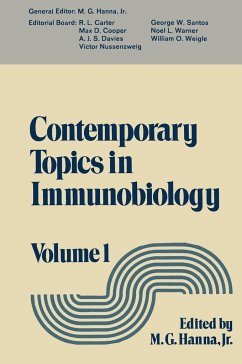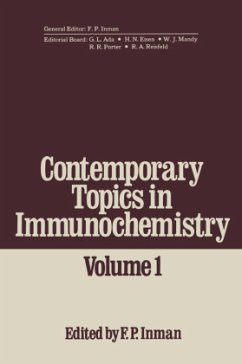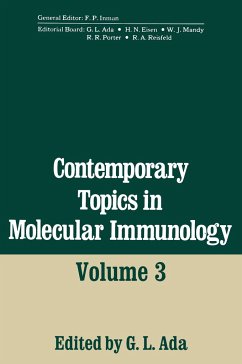
Contemporary Topics in Immunobiology
Volume 3
Herausgegeben: Cooper, Max

PAYBACK Punkte
20 °P sammeln!
Contemporary immunobiology is an ever-diversifying field that embraces many aspects of cellular and humoral immune responsiveness. This includes the phylogeny, ontogeny, induction, regulation, expression, and differentiation of the immune-cell series, as well as the relationship of these to the pathogenesis of many disease processes. It is clearly beyond the limitations of each volume in this series to comprehensively cover progress in each of these fields. Three general areas of contemporary investigations are discussed in the current issue: cellular events of B cell differentiation, includin...
Contemporary immunobiology is an ever-diversifying field that embraces many aspects of cellular and humoral immune responsiveness. This includes the phylogeny, ontogeny, induction, regulation, expression, and differentiation of the immune-cell series, as well as the relationship of these to the pathogenesis of many disease processes. It is clearly beyond the limitations of each volume in this series to comprehensively cover progress in each of these fields. Three general areas of contemporary investigations are discussed in the current issue: cellular events of B cell differentiation, including antigen recognition and respon siveness of B lymphocytes; regulation of the immune response by T cells, and the roles of this regulatory system in allotype suppression and in autoimm unity; and the genetic control of immune responses and its possible relation to disease pathogenesis. Analysis of responsiveness of B lymphocytes has been greatly aided by the availability of athymic nude mice. The immunological responsiveness of these mice to a wide range of stimuli has been reviewed and analyzed by H. H. Wortis. This article concludes with the provocative thesis that in the future "nudes will supply new rather than confirmatory data . . . (especially regarding) the develop ment of neoplasia. " In contrast to the studies on the congenitally athymic mice, G. F.














